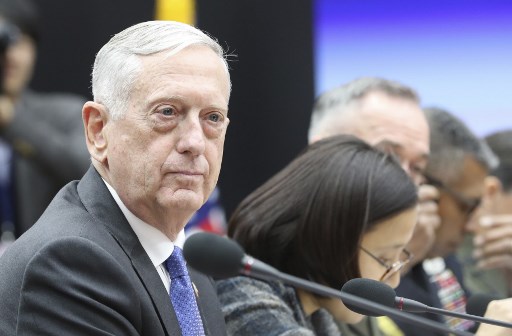

By Thomas Watkins
Agence France Presse
SINGAPORE, Singapore (AFP)–China’s military build-up in the South China Sea and its deployment of high-end weapons systems in the disputed waterway is designed to intimidate and coerce neighbours, US Defense Secretary Jim Mattis said Saturday.
Speaking at a high-profile security summit in Singapore, the Pentagon chief also said the US military continues to support diplomats pushing for the “complete, verifiable and irreversible” denuclearisation of the Korean peninsula.
Mattis said Beijing had deployed a range of military hardware including anti-ship missiles, surface-to-air missiles and electronic jammers across the South China Sea, where it has built islets and other maritime features into hardened military facilities.
Beijing has also landed heavy bombers on Woody Island in the Paracel Islands.
“Despite China’s claims to the contrary, the placement of these weapon systems is tied directly to military use for the purposes of intimidation and coercion,” Mattis told the Shangri-La Dialogue.
He also called out Chinese President Xi Jinping for reneging on a 2015 promise made at the White House that Beijing would not militarise the island features in the South China Sea.
Mattis’ address in Singapore was the second time he had attended the summit since becoming Pentagon chief.
He returned to a theme that he and other senior US officials have hammered since President Donald Trump took office — that America is here to stay in the Asia-Pacific region and that allies should stick with Washington instead of aligning with Beijing.
Tariffs on close allies
But the message of inclusivity, cooperation and working with allies might be a tougher sell for Mattis, who is generally popular on the international scene, after his boss this week imposed metals tariffs on some of America’s closest allies in the name of “national security”.
“Most countries in the region which are part of the global supply chain are anxious that they will be impacted by a trade war between China and the US,” said Murray Hiebert, a senior associate of the Southeast Asia Program at the Center for Strategic and International Studies in Washington.
In a dig at China, which the Pentagon has accused of using “predatory” economics to exploit neighbours, Mattis said the US supports the peaceful resolution of disputes, “free, fair and reciprocal trade and investment” and adherence to international rules and norms.
Despite frequent warnings from Washington about China’s rising might and the pitfalls of its “Belt and Road” global infrastructure initiative, Beijing has faced few consequences for its South China Sea buildup and sweeping territorial claims.
One modest exception came last week when the Pentagon disinvited China from biennial maritime exercises in the Pacific. Mattis characterised this action as an “initial response”.
Delegates hoping for clarity on Trump’s intentions for a scheduled June 12 summit with North Korean leader Kim Jong Un did not get much from Mattis.
He has steadfastly avoided weighing in on the issue, deferring questions to the State Department and Trump’s national security team.
“On the Korean peninsula, we hold the line with our allies, supporting our diplomats who lead this effort,” Mattis said.
“Our objective remains the complete, verifiable, and irreversible denuclearisation of the Korean peninsula.”
